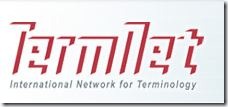Last night, someone asked once again what terminology is. Let me take today’s big event in Seattle to explain: The Seattle Seahawks played the Chicago Bears in a game that I may never fully understand.
 American football is full of terminology for the initiated. It’s jargon to the rest of us. As a laywoman, what I hear is similar to what Ginger, the dog, hears in the Gary Larson* cartoon: “blah blah GINGER blah blah blah blah blah blah blah blah GINGER blah blah blah blah blah.” In the cartoon, Ginger only hears what he understands–his name. In front of TV broadcasting this American football game, I hear: “Blah blah blah blah touchdown blahblah blah Seahawks blah blah blahblah huddle blah blah blah blah quarterback.” I understand only the terms I know.
American football is full of terminology for the initiated. It’s jargon to the rest of us. As a laywoman, what I hear is similar to what Ginger, the dog, hears in the Gary Larson* cartoon: “blah blah GINGER blah blah blah blah blah blah blah blah GINGER blah blah blah blah blah.” In the cartoon, Ginger only hears what he understands–his name. In front of TV broadcasting this American football game, I hear: “Blah blah blah blah touchdown blahblah blah Seahawks blah blah blahblah huddle blah blah blah blah quarterback.” I understand only the terms I know.
Terminology, the collective terms and names of a subject field, are the main vehicle of information in sports communication as in technical communication. If I wanted to be part of the American football culture, I could start by learning the meaning of “on third down”, “tight-end”, or “snap.” Since the majority of Americans cut their teeth on football (similar to Germans on soccer), no sports commentator will change the terminology to accommodate an outsider.
A company trying to gain more customers and make a profit by selling products or services is in a different position. They cannot afford to not use their customers’ terminology, but also to not share the product terminology with the customer. Good product design involves customers and is based on their language to maximize usability and minimize risk.
But they can also not afford to leave people along the content supply chain in the unknown: If I had to write or translate about American football, I would have to research and understand terms, such as “draw play” or “shuffle play,” document them and then use them consistently. If I was the only one not knowing the terminology, the burden would be on me. But if you have dozens of writers and editors creating content for, say, an enterprise resource planning product, you want them to all understand the terms “backflush”, “batch” or “process manufacturing.” If dozens of translators are to bring that content into a target language, such as Japanese, you cannot afford them to not understand, misunderstand or not care. Product usability and liability is at stake.
 The argument might sound a lot less compelling when we think about a Microsoft Office product. Everyone in the US should be familiar with Office terminology, just like they are with American football terminology, right? After all, designations such as “ClipArt,” “address book” or “Page Layout” seem straightforward. Let’s not forget, though, that there are many different reasons why something could be documented in a terminology database. Consistency in the target language is not the least of it. While a single unenlightened German cannot matter to the Seahawk commentator, millions of Japanese users of the Office suite must matter to Microsoft.
The argument might sound a lot less compelling when we think about a Microsoft Office product. Everyone in the US should be familiar with Office terminology, just like they are with American football terminology, right? After all, designations such as “ClipArt,” “address book” or “Page Layout” seem straightforward. Let’s not forget, though, that there are many different reasons why something could be documented in a terminology database. Consistency in the target language is not the least of it. While a single unenlightened German cannot matter to the Seahawk commentator, millions of Japanese users of the Office suite must matter to Microsoft.
So, the next time you are getting into a new field, check out what you don’t understand yet. It is probably the concepts of the new field and with it the terms and phrases, in short the terminology. If you are interested in learning what a “safety blitz” or a “wishbone formation” is, start with this football glossary. And… congratulations to the Chicago Bears!
*The cartoon is not being displayed for another important aspect of terminology management—copyright. For more information, see Gary Larson’s note.

